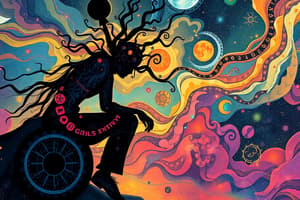Podcast
Questions and Answers
What is the best definition of neurodiversity?
What is the best definition of neurodiversity?
- A framework that denies the existence of mental health disorders.
- The belief that neurological differences are to be recognized and respected as a social category. (correct)
- The notion that all neurological functioning is equal and should be treated the same.
- A term that refers exclusively to conditions like ADHD and autism.
Which of the following features is NOT associated with autism spectrum disorder (ASD)?
Which of the following features is NOT associated with autism spectrum disorder (ASD)?
- Persistent phobias related to social situations. (correct)
- Difficulty in social interaction and communication.
- Sensory sensitivities or unusual sensory interests.
- Repetitive behaviors and restricted interests.
Which therapy type is considered effective for treating attention deficit/hyperactivity disorder (ADHD)?
Which therapy type is considered effective for treating attention deficit/hyperactivity disorder (ADHD)?
- Cognitive-based therapies that focus on skill development. (correct)
- Therapies that emphasize punishment over reward systems.
- Strict behavioral therapies with no involvement of parents.
- Only biological interventions such as medication.
Which of the following is a main feature of oppositional defiant disorder (ODD)?
Which of the following is a main feature of oppositional defiant disorder (ODD)?
Which of the following perspectives might explain conduct disorder (CD)?
Which of the following perspectives might explain conduct disorder (CD)?
Flashcards
What is neurodiversity?
What is neurodiversity?
A perspective that celebrates the diversity of human brains and recognizes that differences in neurological wiring can lead to unique strengths and challenges.
What are the features of Autism Spectrum Disorder (ASD)?
What are the features of Autism Spectrum Disorder (ASD)?
A neurodevelopmental disorder characterized by persistent deficits in social communication and interaction, restricted interests, and repetitive behaviors.
What are the features of Attention-Deficit/Hyperactivity Disorder (ADHD)?
What are the features of Attention-Deficit/Hyperactivity Disorder (ADHD)?
A neurodevelopmental disorder characterized by inattention, hyperactivity, and impulsivity that interferes with daily functioning.
What are the main features of Oppositional Defiant Disorder (ODD)?
What are the main features of Oppositional Defiant Disorder (ODD)?
Signup and view all the flashcards
What are the main features of Conduct Disorder (CD)?
What are the main features of Conduct Disorder (CD)?
Signup and view all the flashcards
Study Notes
Schizophrenia
- Identify the DSM-5 criteria for schizophrenia spectrum disorder.
- Explain and give examples of the main symptoms of psychosis, including delusions, hallucinations, disorganized thoughts/speech, disorganized behavior, and negative symptoms.
- Describe the "typical" phases/ course of schizophrenia spectrum disorder.
- Differentiate brief psychotic disorder, delusional disorder, schizophreniform disorder, schizophrenia spectrum, and schizoaffective disorder
- Explain schizophrenia from the biological, cognitive, and sociocultural perspectives.
- Explain schizophrenia according to the diathesis stress model.
- Identify the main biological, cognitive-behavioral, and sociocultural supports for persons with schizophrenia.
- Explain the link between cannabis use and psychosis (per the NOVA video).
Neurodiversity
- Define neurodiversity.
- Identify the features and DSM-5 criteria for autism spectrum disorder (ASD).
- Identify the features and DSM-5 criteria for attention deficit/ hyperactivity disorder (ADHD).
- Describe the biological variations and perinatal risk factors associated with ASD/ADHD.
- Explain the effectiveness of biological, behavioral, and cognitive therapies for ASD/ADHD.
- Explain neuro-affirming/ inclusive supports for neurodiverse persons.
Personality Disorders
- Define personality disorder according to the DSM-5.
- Identify the three clusters of personality disorders in the DSM-5.
- Describe the main features of the 10 personality disorders in the DSM-5.
- Explain ego-syntonic vs. ego-dystonic (and which term applies to personality disorders).
- Identify the pros and cons of the categorical vs. dimensional model of personality disorders.
- Explain the psychodynamic, cognitive, behavioral, and biological theories of personality disorders.
- Describe treatment challenges, strategies, and outcomes for personality disorders.
- Describe the main components of Dialectical Behavioral Therapy (DBT).
Childhood Behavior Disorders
- Describe the main features of oppositional defiant disorder (ODD).
- Describe the main features and subtypes/ specifiers for conduct disorder (CD).
- Explain ODD/ CD from the behavioral, cognitive, biological, and diathesis stress perspectives.
- Describe treatment options for ODD/CD.
Gender Dysphoria
- Differentiate sex, gender, gender identity, gender expression, and sexual identity.
- Differentiate cisgender, transgender, gender fluid, and non-binary.
- Identify the clinical features of gender dysphoria as per the DSM-5.
- Explain gender dysphoria from the behavioral, biological, and sociocultural perspectives.
- Explain the David Reimer case study and how it relates to understanding gender.
- Discuss supportive options for persons experiencing gender dysphoria.
Paraphilic Disorders
- Define paraphilia and paraphilic disorder.
- Describe exhibitionistic, fetishistic, transvestic, voyeuristic, frotteuristic, sexual masochism, sexual sadism, and pedophilic disorder, according to the DSM-5.
- Explain paraphilic disorders from behavioral and biological perspectives.
- Discuss the efficacy of biological, behavioral, and cognitive therapies for paraphilic disorders.
Studying That Suits You
Use AI to generate personalized quizzes and flashcards to suit your learning preferences.
Related Documents
Description
Test your knowledge on neurodiversity and its related psychological disorders through a series of thought-provoking questions. This quiz covers topics such as autism spectrum disorder, attention deficit/hyperactivity disorder, and conduct disorder. Challenge yourself to identify key features and effective therapies related to these conditions.




